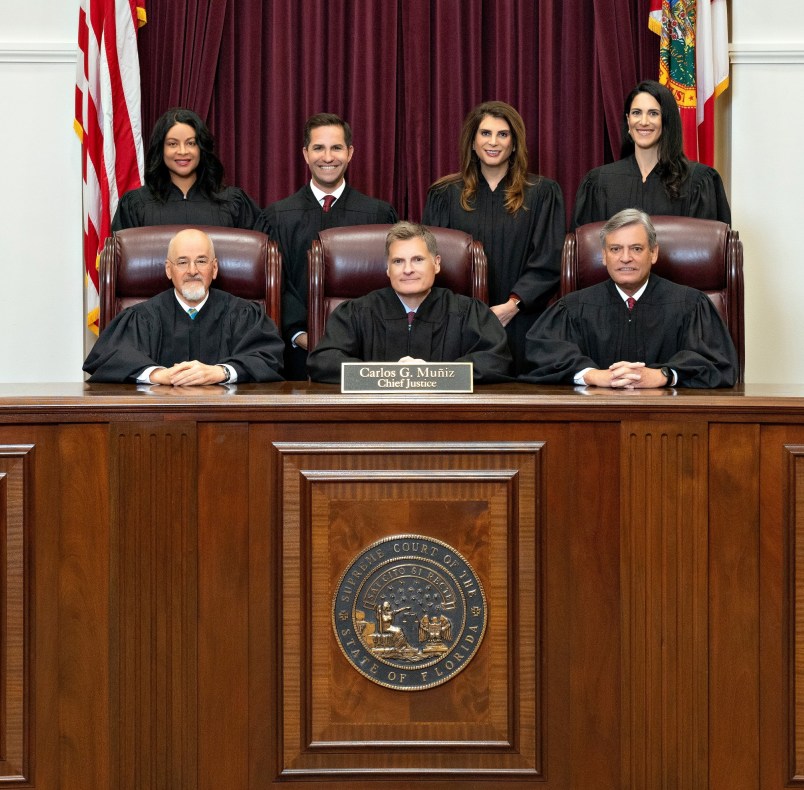During Wednesday’s arguments over the language of a proposed ballot initiative to protect abortion rights, Florida Supreme Court Chief Justice Carlos Muñiz kept returning to a well neither side had briefed.
“It talks about ‘all natural persons are equal before the law and have unalienable rights’ — I don’t know that I could affirmatively say that the term ‘natural person,’ as a matter of just ordinary meaning, doesn’t include the unborn,” Muñiz said. “We certainly talk about the unborn that way.”
Muñiz was quoting from one of the earliest passages in Florida’s constitution that says that all natural persons “are equal before the law and have inalienable rights, among which are the right to enjoy and defend life and liberty, to pursue happiness, to be rewarded for industry, and to acquire, possess and protect property.” If this passage applied to “the unborn” — or in non-anti-abortion political speak, embryos and fetuses — abortion at every stage would be murder. This is a state-level version of fetal personhood, the anti-abortion white whale.
While Muñiz was eager to promote his radical interpretation of the state constitution, Florida, even under its hard-right regime, does not presently embrace it. The state currently has a 15-week abortion ban, with a six-week one tangled up in court. If the state was operating under his preferred approach, abortion would likely be banned completely.
Florida Attorney General Ashley Moody (R) had asked for the state Supreme Court to issue an advisory opinion on whether the text of the proposed ballot initiative — titled “Amendment to Limit Government Interference with Abortion” — was misleading or contained multiple subjects. The proposed amendment states that no law shall “prohibit, penalize, delay, or restrict abortion before viability or when necessary to protect the patient’s health.”
In most states where abortion rights advocates have pushed for a ballot initiative, Republican officials often lodge challenges at each procedural step to try to quash the effort. As of early January, the group behind the ballot initiative, Floridians Protecting Freedom, announced that it had gathered well over the 891,523 signatures required to get the proposal on the 2024 ballot.
On Wednesday, many of the chief justice’s colleagues — all of whom were appointed by Republican governors — also reflexively adopted anti-abortion postures.
“Why would it be unreasonable for a voter to read this language and say, ‘I’ll vote for it because the legislature will be able to have a ban at 21 weeks with exceptions for the health of the mother?’” Justice Meredith Sasso asked, parroting the attorney general’s dubious argument that the term “viability” is unimaginably vague and freighted with double meanings.
As Floridians Protecting Freedom attorney Courtney Brewer tried to respond that such a read would be “inconsistent” with the language of the initiative, Sasso quipped that that would “be a surprise to a lot of voters.”
Still, despite the court’s clear comfort echoing the arguments of its political allies, some of the anti-ballot initiative arguments were too flimsy for even these judges to swallow.
Judge Charles Canady, chuckling with incredulity at one of the anti-initiative group’s arguments that the amendment rolls together multiple subjects, read off a line from the Florida constitution’s freedom of speech passage.
“If somehow that had been omitted and we were faced with an initiative to add such language, it sounds like, to me, your argument would be we’d have to strike that too!” Canady exclaimed.
Canady pushed back most consistently against the lawyers for the attorney general and group formed to oppose the initiative throughout, at one point accusing them of imposing “an impossible burden on the people proposing an amendment,” by demanding that they explain in the proposal all the possible legal knock-on effects. Canady, ironically, is married to the co-sponsor of Florida’s six-week ban, and ignored calls to recuse himself from the case.
Still, the deck is heavily stacked against the abortion rights side, both at court and in general. Florida voters had in 2006 approved a constitutional amendment proposed by the legislature that all amendments must be approved by a 60 percent supermajority. Such a high threshold would have thwarted other states’ recent abortion initiative successes, particularly the major win in Ohio, where voters passed protections by about 57 percent (and where Republican legislators tried unsuccessfully to hike the threshold to 60 percent as well). One poll from November, though, showed 62 percent of respondents in favor of the proposal, including over half of registered Republicans.
Similarly to Ohio, Republicans dominate every part of Florida government, from the governor’s mansion to the state Supreme Court to the severely gerrymandered legislature. A ballot initiative is almost certainly the only way to preserve abortion rights in the state, and to head off permanently the not-yet-enacted six-week ban Gov. Ron DeSantis (R) has already signed.







“The state currently has a 15-week abortion ban, with a six-week one tangled up in court. If the state was operating under his preferred approach, abortion would likely be banned completely.”
Alcohol passes through the umbilical cord to a fetus. Providing alcohol to a minor is illegal in almost all states under any circumstance. If some get their way regarding the beginning of life and the status of a fetus, wouldn’t it mean women have to be barred from consuming alcohol during pregnancy?
Florida voters are the only ones that can fix this. They keep voting for these people, so they must be ok with it.
The judges were appointed by Republican governors. How did Florida get Republican governors?
The legislature is as follows:
Florida Legislature - Wikipedia
How did that happen?? Florida voters.
Look, we have to stop being concerned about FL. They’re either gonna wake up and smell the coffee or they’re going to become Gilead.
It’s that simple.
Zygots are people.
Protect the unborn geriatric.
Soon enough some state will decree sperm is half a person and make masturbation illegal.
We long-suffering Florida Democrats sure appreciate the support!